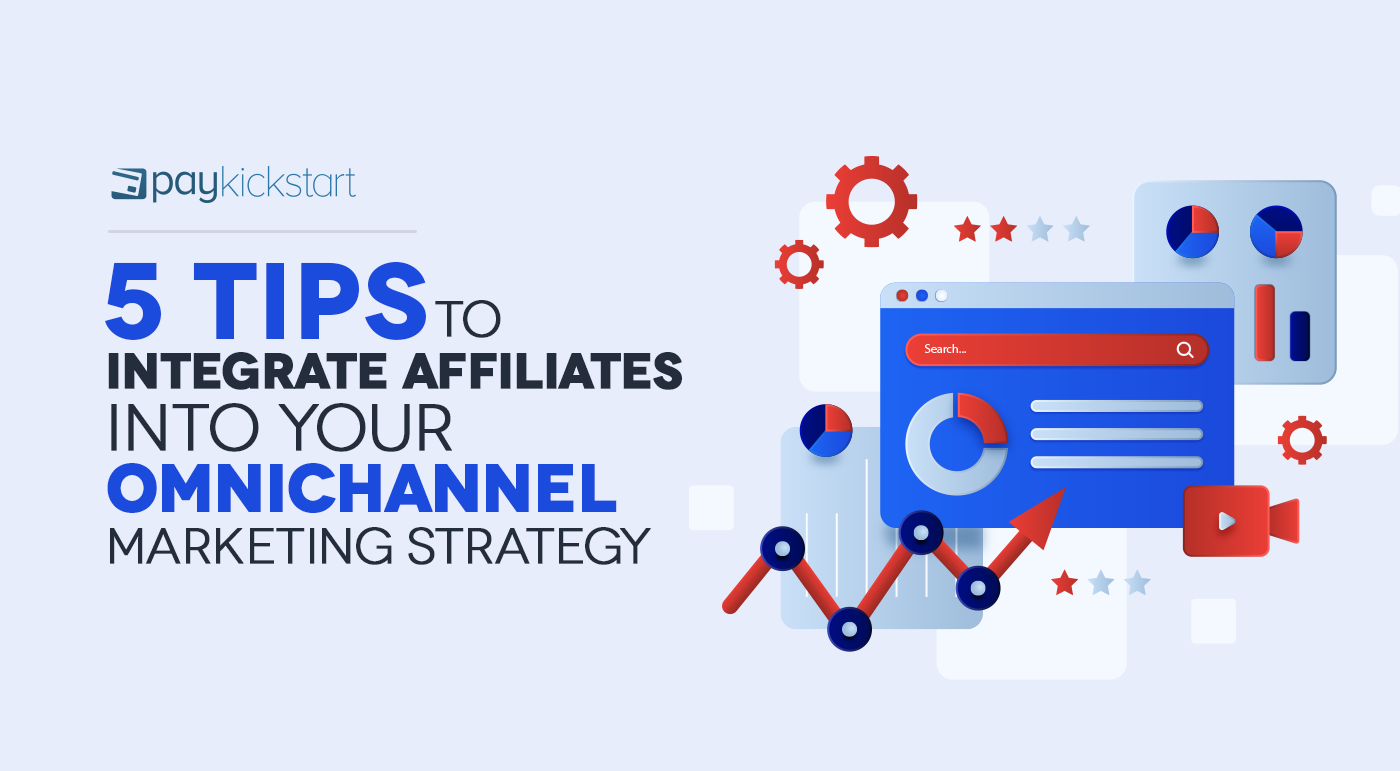Subscription growth hack (by PayKickstart)
Facebook Group - 3,932 members
Visit Group
The buying process is no longer linear and is now a multi-channel experience. Free access to information has changed the buying behaviors of the digital consumer. Shoppers are now more price-savvy as they are able to scour the web for incredible deals and exclusive offers before committing to a purchase. Social connectedness has also given rise to more principled shoppers who trust the guidance of influencers and prefer to support businesses with shared values.
These changes to consumer behavior have ultimately transformed digital marketing, especially for ecommerce stores and SaaS platforms. Omnichannel marketing is now a necessity as businesses strive to be present in all relevant channels in an effort to drive sales through positive engagements at every touchpoint. But possibly one of the most impactful additions to an omnichannel strategy is the integration of a robust affiliate marketing strategy.
In this piece, we’ll go over how to use affiliate marketing to its full potential, and how to integrate it within an omnichannel strategy.
Affiliate marketing is incredibly cost-effective because of its results-based payment structure. Plus, affiliates essentially serve as your self-motivated sales force as long as you give them access to compelling sales assets and offer a competitive incentive structure. You also need to back up their efforts by delivering on your brand’s promises.
Conversational marketing commerce strategies have also become a popular way to engage shoppers throughout the buying process. With affiliate marketing, that conversational commerce is maintained with an influencer that has a certain proximity to a community, who then recommends products as part of the content they provide. This capitalizes on word-of-mouth marketing, which is a powerful marketing strategy for online businesses.
When planned and executed correctly, adopting an affiliate marketing strategy and integrating it into your omnichannel marketing campaign can be an excellent way to boost sales and accelerate the growth of your digital business. Here are some of the most significant ways it can complement your omnichannel strategy:
Affiliate programs have long been proven effective in driving sales and stimulating the growth of ecommerce stores. This model has also been useful for digital goods, most especially for promoting SaaS products. Although affiliate marketing is undoubtedly powerful on its own, implementing it in combination with an omnichannel marketing strategy makes it much more valuable.
One of the most critical reasons why affiliate marketing works incredibly well with omnichannel marketing is that it enables your brand to be even more omnipresent. Every affiliate is an additional means to build awareness for your brand and drive targeted traffic to your own channels. Generally, the more affiliates you have, the wider the reach of your business.
Depending on how your affiliate marketing campaign is implemented, it has the potential to positively impact your search engine rankings. Affiliate sites don’t necessarily pass on link equity to your own pages either because they are no-follows or they point to an affiliate network’s servers. Nevertheless, Google Search Central’s documentation on affiliate programs clearly states that only thin affiliates—those that publish duplicate content from merchants or affiliate networks—negatively impact SEO.

High-quality affiliates—those that add value through original, useful, and relevant content—can bring incredible value to you as the original merchant. Every high-quality affiliate will boost your visibility, and further drive targeted traffic, which leads to better conversions. Overall, whether directly through link equity or indirectly through several Google ranking factors, affiliate marketing can have a significant impact on your SEO.
Affiliates are a remarkable way to satisfy the price-savvy buyer’s need to shop at a bargain. Vendors often give their affiliates access to valuable offers, which they can extend to their audiences to grow their own following while also gaining commissions on sales. For online shoppers, discovering deals outside of a vendor’s main website is incredibly effective because these give off a feeling of exclusivity.

Many businesses also work closely with their best affiliates to promote exclusive events like giveaways or competitions. These further help drive traffic and boost brand recognition. Ultimately, the ability of affiliate sites to quench the modern consumer’s thirst for great deals will funnel in more leads to your pipeline. It would then be up to you to use your various channels to convert those leads.
Affiliate marketers tend to target very specific niches. When those niches coincide with yours, it could be a truly profitable partnership for you both. As affiliates are practically influencers, it is absolutely essential for them to implement effective customer retention strategies since they rely heavily on the trust of their customers who look to them for guidance and recommendations within their field.

Partnering with an affiliate marketer gives you access to a highly targeted audience. In many cases, these influencers won’t have massive followings but will boast excellent engagement rates because of the quality of relationships they have with their audiences. Working with such marketers for lead generation enables you to not only focus your resources on high-quality leads but also build better relationships with potential customers.
A critical feature of a successful omnichannel marketing campaign is how seamlessly one channel integrates with the other. The customer experience needs to be consistent at every touchpoint, no matter the channel used to engage with the brand.
For affiliate marketing to work alongside an omnichannel marketing strategy, it should be treated as if it were another channel. This would be tricky because the very nature of affiliates is that they work independently and are external to the organization. However, it is critical to ensure consistent messaging and seamless integration of affiliate assets into your own.
Here are a few crucial tips to successfully combine your omnichannel marketing strategy with an affiliate marketing campaign:
Omnichannel marketing only works when you put customers at the center and enable your different departments to work together seamlessly. Doing this successfully requires both a change in technology and a shift in mindset. This is especially critical in marketing where you need to eliminate silos and promote a singular campaign across all your channels.
Enabling affiliate marketers to form part of your cohesive marketing team allows them to work more closely and cooperatively with you. This will lead to consistency and a concerted effort to provide personalized marketing and excellent customer experiences that ultimately lead to better conversions.
Another crucial part of integrating your affiliates seamlessly into your omnichannel marketing strategy is to make sure that their messaging is consistent with yours. To ensure this, many marketers prefer to prepare content for affiliates to publish. Although this assures consistency with your brand, it doesn’t give the affiliate the opportunity to prepare content based on what they know about how to engage their own audiences.
For omnichannel and affiliate marketing to work properly, you should require all affiliates to produce original content. Prepare extensive briefs about your brand image and preferred messaging, and give your affiliates the freedom to prepare their own content in a voice that’s consistent with their own affiliate platforms.
There’s a variety of different ways you can support your affiliates and help them create content that’s both consistent with your messaging and with their organic content that already resonates with their audience. For example, PayKickStart offers the ability to add banners or email swipe content, which is a great way to help pull in new leads for you while keeping their content as organic as possible.
Another great way to work with your affiliate is to engage them with an affiliate contest. This is great for any brand that works with several affiliates. By simply running a contest for them, you can use a friendly competition to incentivize them.
This way, you maximize the value that affiliate marketers bring. You also need to trust that they’re motivated enough to prepare sales-enabled content since they rely on commissions for revenue.
Affiliate marketers are most effective at driving leads when they’re given access to exclusive content to promote. So, study your offerings closely and prepare creative offers to give your affiliates the best chance of success. You can also work closely with some of your best-performing affiliates to create unique offerings that would resonate well with their own audiences.
Additionally, your relationship with your affiliates need not be one way. Of course, they will use their platforms to promote your products and services, but you can also use your different channels to promote them. This is especially useful for publicizing exclusive affiliate content like competitions, remarkable discounts, and other great deals. Supporting your affiliates this way will also enable you to attract the best affiliates.
One of the main advantages of affiliate marketing is that it is completely trackable. Detailed analytics will give you all the data you need to gather insights on what offers and content lead to better conversions. These systems will also collect and report all the necessary data to accurately track affiliate performance and overall contribution to your bottom line.

To make the most out of your affiliate marketing, identify your best-performing affiliates and work with them to come up with even better ways to engage their own audiences. Additionally, you can track your worst-performing affiliates and figure out how to help them improve.
For omnichannel marketing to be successful, it’s critical to be customer-centric. However, it’s not just your end-users but also your affiliates that you need to cultivate excellent relationships with. This all starts by giving them all they need to give them the best chance of success at promoting your business. This includes detailed briefs about your products and messaging, as well as exclusive offers to promote.
Additionally, you need to value your affiliates as individual contributors to your business. Avoid micro-managing them. Trust that they know the best ways to engage their own audiences and give them the freedom to do so. Lastly, use your channels to promote them as well. Apart from helping promote their business, this will help them feel that you treat them as respected partners.
Affiliate marketing is one of the oldest digital marketing methods and yet it persists to this day despite drastic changes in the ecommerce and SaaS landscape. While newer methods like conversational marketing commerce campaigns undoubtedly boost customer engagement throughout the buying process, affiliate marketing is a tried-and-tested means to improve brand awareness and expand your reach in a cost-effective manner. You just need to maintain excellent relationships with your affiliates and give them access to plenty of tools to succeed.
When combined with an omnichannel marketing strategy, you’ll have the perfect system to attract more potential customers, keep them engaged at every stage of the sales funnel, and generate sales. You’ll also be better able to maintain top-of-mind status for your brand as well as nurture your buyers to become lifelong customers.
Katrina is a writer for Omnisend. She is a freelance content writer who specializes in ecommerce and digital marketing subjects. Beyond her workstation, she is a devoted dog mom.
Read More About Katrina V. Dayrit